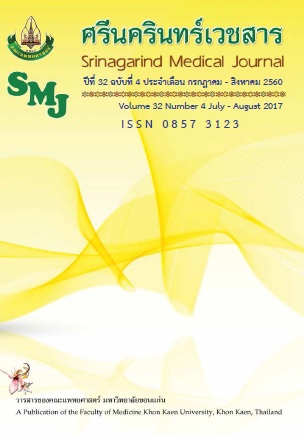Validity of Heartbeat, Respiratory and Inspiration Muscle Strength Parameters from a Prototype of a Respiratory Device in Healthy Adults
Keywords:
heart rate, respiratory rate, slow and deep breathing, inspiratory muscle training, blood pressure, อัตราการเต้นของหัวใจ, อัตราการหายใจ, การหายใจช้า-ลึก, ความแข็งแรงของกล้ามเนื้อหายใจเข้า, ความดันโลหิตAbstract
Background and Objective: Evidence has shown that breathing training whether slow and deep breathing training or inspiratory muscle training significantly reduces blood pressure. However, the breathing devices have been imported and the price is too expensive. Therefore, the aims of research were to develop a prototype of respiratory device which could be detecting heartbeat, respiratory and inspiratory muscle strength and also examine validity of the prototype of a respiratory device.
Methods: Thirty healthy participants underwent heart beat and breathing monitoring from cardiorespiratory monitor (Electrocardiography (ECG): Philips Intellivue MP20) and the prototype of respiratory device. All participants were asked to rest for 10-minute and then heart beat and respiratory rate were recorded. In addition, inspiratory muscle strength was detected by respiratory pressure meter (MicroRPM™). The participants performed MicroRPM™ while the prototype of breathing device was underwent. The volunteers were asked to take a deep breath by using diagram muscle for 3 times and then a maximal of inspiratory muscle pressure was recorded.
Results: The study found that no difference of breathing, heart beat and inspiratory muscle strength from the prototype of respiratory device compared to standard monitors. The validity of respiratory and heart beat from the parameters were within +0.51±1.13 bpm and +0.38 ± 1.71 bpm, respectively. Regarding to inspiratory strength, it was different within -1.57±2.64 cmH2O.
Conclusion: Validity was observed in heart beat, respiratory and inspiratory muscle strength from the prototype of breathing device in healthy adults.
ความถูกต้องของค่าการหายใจ การเต้นของหัวใจ และความแข็งแรงของกล้ามเนื้อหายใจเข้า จากเครื่องต้นแบบการหายใจ ในกลุ่มผู้ใหญ่สุขภาพดี
กรอนงค์ ยืนยงชัยวัฒน์*1, ศศิภา บูรณพันธฤกษ์1, ขจรศักดิ์ พงษ์พานิช1, ชูศักดิ์ ธนวัฒโน2
1ภาควิชากายภาพบำบัด คณะสหเวชศาสตร์ มหาวิทยาลัยธรรมศาสตร์
2ศูนย์เทคโนโลยีอิเล็กทรอนิกส์และคอมพิวเตอร์แห่งชาติ
หลักการและวัตถุประสงค์: มีหลักฐานที่แสดงให้เห็นว่าการฝึกการหายใจไม่ว่าจะเป็นการกำหนดการหายใจ แบบช้าและลึก หรือการฝึกความแข็งแรงของกล้ามเนื้อหายใจเข้า สามารถลดความดันโลหิตได้ อย่างไรก็ตาม การใช้อุปกรณ์เครื่องมือดังกล่าว ยังต้องมีการนำเข้าจากต่างประเทศ ซึ่งมีค่าใช้จ่ายในราคาที่แพง ดังนั้นในการศึกษาครั้งนี้จึงเป็นการสร้างเครื่องมือต้นแบบสำหรับการวัดค่าการเต้นของหัวใจ การหายใจ และความแข็งแรงของกล้ามเนื้อหายใจเข้า รวมถึงศึกษาความถูกต้องของเครื่องมือต้นแบบในกลุ่มผู้ใหญ่สุขภาพดี
วิธีการศึกษา: อาสาสมัครทั้งเพศหญิงและชาย จำนวน 30 ราย ที่มีสุขภาพดี วัดอัตราการหายใจ อัตราการเต้นของหัวใจ ด้วยเครื่อง Electrocardiography (ECG) รุ่น Philips Intellivue MP20 bedside monitor โดยอาสาสมัคร ทำการนั่งพักเป็นเวลา 10 นาที บันทึกค่าการหายใจ และค่าการเต้นของหัวใจ สำหรับการวัดค่าความแข็งแรงของกล้ามเนื้อหายใจ ทดสอบด้วยเครื่อง Respiratory pressure meter รุ่น MicroRPM™ โดยให้อาสาสมัครทำการหายใจเข้าโดยใช้กระบังลม บันทึกค่าความแข็งแรงของกล้ามเนื้อหายใจเข้าโดยทำการทดสอบ 3 ครั้ง เลือกค่าที่มากที่สุดในการวิเคราะห์ผล
ผลการศึกษา: พบว่าไม่พบความแตกต่างของค่าการเต้นของหัวใจ การหายใจ และ ความแข็งแรงของกล้ามเนื้อหายใจเข้า ที่ได้จากการวัดด้วยเครื่องต้นแบบกับการวัดด้วยเครื่องมาตรฐาน โดยพบมีค่าความถูกต้องของค่าการหายใจและการเต้นของหัวใจ อยู่ที่ +0.51 ± 1.13 ครั้งต่อนาที และ +0.38 ± 1.71 ครั้งต่อนาทีตามลำดับ สำหรับค่าความแข็งแรงของกล้ามเนื้อหายใจเข้า มีค่าความแตกต่างอยู่ที่ -1.57 ± 2.64 เซนติเมตรน้ำ
สรุป: เครื่องต้นแบบการหายใจมีความถูกต้องในการอ่านค่าของค่าการเต้นของหัวใจ การหายใจและความแข็งแรงของกล้ามเนื้อหายใจเข้า ในอาสาสมัครสุขภาพดี




